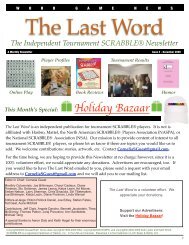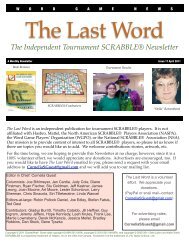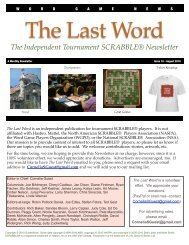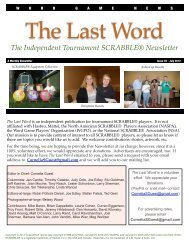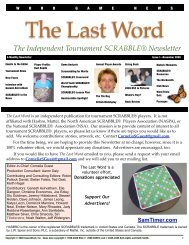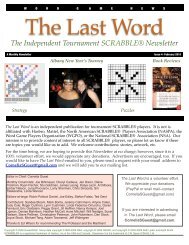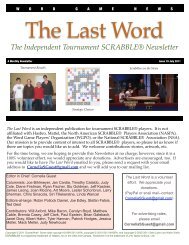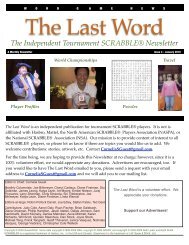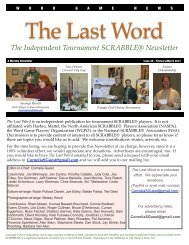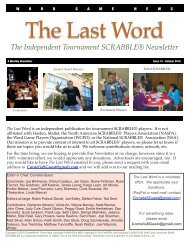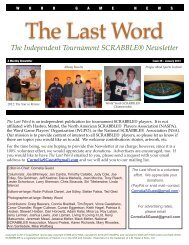SCRABBLE - The Last Word Newsletter
SCRABBLE - The Last Word Newsletter
SCRABBLE - The Last Word Newsletter
You also want an ePaper? Increase the reach of your titles
YUMPU automatically turns print PDFs into web optimized ePapers that Google loves.
64T H E W O R D S M I T Hturn, American English. We word-game players are the beneficiaries of a long, often bloody, and inmany ways inequitable history of empire.<strong>The</strong> world might be a fairer and better place had the British remained on their island, but our favoriteword game would, I think, be much poorer in vocabulary had the Rosetta Stone never been located.That goes double for the Collins lexicon.So much for high culture on our first, 35-hour, jet-lagged day.<strong>The</strong> next morning, and on several occasions during the week, we noted the many differencesbetween British and American English.One delightful example could be seen on a sign above the fish and chips shop across the streetfrom our hotel in Greenwich: “<strong>The</strong> Golden Chippy.”As an adjective, CHIPPY means belligerent, and, in reference to sports – hockey and soccer cometo mind – describes that moment when the play has grown a bit rougher than normal, although notnecessarily outright hostile.Interestingly, our tour guide had never heard the word used in this way. To him, it simply meant fishand chips.But CHIPPY is also a noun meaning a prostitute, and can also be spelled CHIPPIE, for bothprostitute and fish and chips. While none of us visited <strong>The</strong> Golden Chippy, I am almost certain it wasselling dinners, and not catering to wealthy men in search of female companionship.Exactly how all this CHIPPY business got started is anyone’s guess, but the words appear to havecarried both meanings (belligerence and prostitution) on both sides of the Atlantic for well over acentury, although the reference to food is limited to England.(Except, of course, we Americans do use hips to describe the potato snacks that the British callcrisps.)A few days later, in Oxford, we passed another of the touchstones of modern literary culture, <strong>The</strong>Eagle and Child pub, where J.R.R. Tolkien, C.S. Lewis and other members of the literary circleknown as the Inklings met to share lunch, liquid refreshment, and literary ideas.INKLING, of course, is a common enough word meaning “a slight suggestion,” but despite its soundand the apparently obvious link to ink, the word seems to have arrived at its modern Englishmeaning through a very different route, and had nothing to do with ink per se.Start with the French niche, bring that into Middle English as nik, meaning a notch or tally, and thennikking, a “hint or whisper.” One spelling variation, found in just one printed source, is ningkiling, andvoila – one has the modern English INKLING.In Stratford-upon-Avon we had the privilege of attending a perfomance of As You Like It by theRoyal Shakespeare Company, which reaffirmed my belief that the Bard of Avon’s work is essentiallyflat when read, but sublime when performed. Reading the plays is OK, but I think most fondly of thehandful I have seen put to the stage or screen, including King Lear, Othello, and Henry V.Shakespeare deserves any number of columns to himself, so I will forgo any discussion of his workhere. But I did stumble upon one very interesting etymological – and entomological – connectionwhile touring his birthplace.



